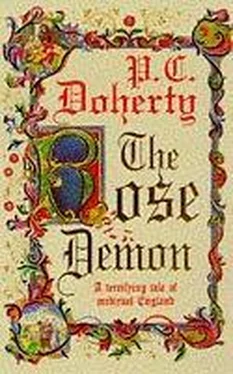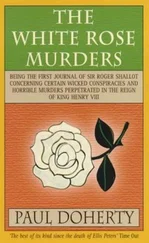Paul Doherty - The Rose Demon
Здесь есть возможность читать онлайн «Paul Doherty - The Rose Demon» весь текст электронной книги совершенно бесплатно (целиком полную версию без сокращений). В некоторых случаях можно слушать аудио, скачать через торрент в формате fb2 и присутствует краткое содержание. Жанр: Исторический детектив, на английском языке. Описание произведения, (предисловие) а так же отзывы посетителей доступны на портале библиотеки ЛибКат.
- Название:The Rose Demon
- Автор:
- Жанр:
- Год:неизвестен
- ISBN:нет данных
- Рейтинг книги:5 / 5. Голосов: 1
-
Избранное:Добавить в избранное
- Отзывы:
-
Ваша оценка:
- 100
- 1
- 2
- 3
- 4
- 5
The Rose Demon: краткое содержание, описание и аннотация
Предлагаем к чтению аннотацию, описание, краткое содержание или предисловие (зависит от того, что написал сам автор книги «The Rose Demon»). Если вы не нашли необходимую информацию о книге — напишите в комментариях, мы постараемся отыскать её.
The Rose Demon — читать онлайн бесплатно полную книгу (весь текст) целиком
Ниже представлен текст книги, разбитый по страницам. Система сохранения места последней прочитанной страницы, позволяет с удобством читать онлайн бесплатно книгу «The Rose Demon», без необходимости каждый раз заново искать на чём Вы остановились. Поставьте закладку, и сможете в любой момент перейти на страницу, на которой закончили чтение.
Интервал:
Закладка:
The days passed. Matthias’ supply of silver dwindled. He lost his garret but the landlord agreed, in return for Matthias doing tasks around the tavern, that he could sleep in the stable. Matthias eventually had to sell his horse and saddle but he kept his arms. He tired of walking St Paul’s and spent more time out in the graveyard where the thieves and rogues of London sheltered from the sheriff’s men.
One day, about a month after his arrival in London, Matthias was sitting with his back to the wall sunning himself. He was wondering if he should leave and go back to Baron Sanguis when someone tapped his foot. He raised his head, shading his eyes, and peered up at a grizzled-faced, one-eyed man.
‘God save us both, if it’s not Master Matthias Fitzosbert!’
The fellow crouched down. Matthias studied the narrow-seamed face, the white eye covered by a milky film, the other dancing with mischief. The man was dressed in a soiled ragged shirt, tattered leather jacket and hose. He wore two right boots of different size but Matthias noticed the sword and dirk pushed in the waistband were sharp and clean.
‘Do I know you, sir?’
‘Dickon,’ the fellow replied. ‘Don’t you remember, Master? The gatehouse at Barnwick? I served as an archer there. I held you down the day. .’ the good eye began to flutter, ‘. . the day young Rosamund was killed.’
Matthias closed his eyes and sighed. ‘Of course!’ He looked at the man. ‘So, what have you been doing?’
Dickon shrugged. ‘Well, when we were driven out of Barnwick, I thought that’s it: no more soldiering for Dickon boy! I travelled south, a little bit of fighting here, a touch of robbery there.’ Dickon was now peering at him carefully. ‘I’ve never forgotten you, Master Fitzosbert. Even now I still tell my friends about the north tower of the keep. Do you remember it?’
‘If I have to.’
‘You seem down on your luck.’ Dickon sat beside him.
‘I’d say that was a fair assessment of my situation.’
Dickon patted him on the thigh. ‘I thought you were dead.’ He shifted, his good eye studying Matthias. ‘But, of course, the likes of you don’t die, do they? Do you have any money?’ he continued.
Matthias flicked his empty wallet. ‘I have what you see. And, as for food, I’d give my right arm for a meat pie and a tankard of ale.’
Dickon scrambled to his feet. ‘Come on!’ he urged. ‘I have someone who would like to meet you.’
Matthias stayed where he was. ‘Who is he?’
‘Henry Emloe. He’s a. .’ Dickon grinned, ‘he’s a merchant, a trader. You’ll get more than a meat pie and a blackjack of ale from him.’
Matthias glanced round the graveyard: the tawdry stalls, the mummers and the jackanapes. Perhaps it might be best to stay rather than go, cap in hand, to Baron Sanguis. He scrambled to his feet and followed Dickon out along Bowyers Row, past Blackfriars. They crossed the Fleet river and entered the tangled maze of alleyways which surrounded the great convent of Whitefriars. Matthias had never been here before. It was a small town in itself: a ward dominated by thieves, cutthroats and wolf’s-heads. The great-storeyed houses were shabby and dilapidated. They rose up so close together, the lanes and alleys beneath narrow and gloomy. Ramshackle bridges stretched from one house to another. The doorways to the taverns were thronged with beggars, men and women who had good reason to hide from the law. There were no stalls, but hawkers and garishly dressed journeymen pushed their wheelbarrows around, piled high with goods and trinkets they had filched from the markets in Cheapside. Whores, guarded by their pimps, called out salacious invitations. Every so often Dickon and Matthias were stopped and asked their business. The men were some of the most depraved Matthias had ever seen: their faces showed their souls were steeped in villainy. Some bore the mutilations of previous punishments: brand marks upon their faces, slit noses and lips, their hair was often long to conceal cropped and clipped ears. A few had lost a hand or a foot. Nevertheless, they were all well armed and watchful over who passed along their respective street or alleyway. Dickon did not carry or show any pass, he simply murmured Emloe’s name and these self-appointed guardians slunk back into the darkness.
Dickon brought Matthias to a house standing at the mouth of an alleyway which led down to the river. The house was four-storeyed with wooden plaster. The paint was peeling, falling like flakes into the small, overgrown garden which stood in front of it. Dickon went down the uneven pathway and rapped hard at the knocker shaped like a grinning skull. The door opened, Dickon beckoned Matthias inside.
At first, because the passageway was so gloomy, Matthias had to blink and place his hand against the wall to get his bearings. The passageway was long. The wainscoting on either side was of black shiny wood: the strip of plaster above painted purple. A few candles, also purple, burnt in bright steel holders but they created more shadow than light.
‘Come on! Come on!’ Dickon whispered.
Matthias followed him deep into the house. They passed chambers, then went up a broad stairway, its woodwork also painted a glossy black. Matthias felt he was entering a house of death. The drapes which hung on the walls and galleries were all sombre, sometimes lined with silver silk. However, despite the poor light and the shabby exterior, the house was opulently furnished. Woollen rugs woven together covered most of the floor and deadened any sound. Heavy drapes covered walls and doorways. The tables and benches were all carefully sculptured and, again, painted black. Matthias was about to express his concern when Dickon turned abruptly, finger to his lips.
‘The walls have ears,’ he murmured. ‘And I mean what I say!’
They walked on. Matthias stopped to examine a painting, a man ladling out silver coins in a counting house, beside him two young women, the tops of their dresses cut low to expose full ripe breasts. Matthias pretended to be fascinated but he noticed a movement and realised that there were eyelets in the picture to allow others to peer out. Again Dickon hoarsely urged that he should hurry. Matthias was about to follow when out of the shadows stepped a man, his face hidden by a hood pulled well over his head. A sword peeped out from beneath his cloak and he carried a cudgel. Matthias bowed sardonically at this sinister, silent guard and hurried on.
The second gallery was much the same. Matthias was led into a small chamber. It had a window open: this offset the dark funereal cloths on the wall and the silver death’s-head placed in the middle of a shiny table which stood in the centre of the chamber. Matthias went to the window and stared out as Dickon closed the door behind him. He glimpsed the dark swirling waters of the Thames and watched as a seagull skimmed lazily over the surface. He heard a sound and turned.
The man who stood in the doorway was very tall and angular. His black hair was closely cropped well above his ears; his long, narrow face had a lantern jaw and protruding spiky nose, thin bloodless lips and eyes as dead as pieces of glass. He was dressed like a priest, in a black gown from neck to toe, his hands hidden up the sleeves of his habit. The man bowed.
‘I am Henry Emloe,’ he declared softly. ‘Welcome to my house. You wish some wine?’
And, before Matthias could answer, Emloe brought his hand up and clicked his fingers. Emloe continued staring at Matthias, as if memorising every single feature. A servant bustled in, his face hidden by a hood. He placed a silver tray bearing a jug and goblets on the table and scurried out. Emloe poured the wine himself. It came thick and red, swirling out like blood. He passed a cup to Matthias and toasted him.
Читать дальшеИнтервал:
Закладка:
Похожие книги на «The Rose Demon»
Представляем Вашему вниманию похожие книги на «The Rose Demon» списком для выбора. Мы отобрали схожую по названию и смыслу литературу в надежде предоставить читателям больше вариантов отыскать новые, интересные, ещё непрочитанные произведения.
Обсуждение, отзывы о книге «The Rose Demon» и просто собственные мнения читателей. Оставьте ваши комментарии, напишите, что Вы думаете о произведении, его смысле или главных героях. Укажите что конкретно понравилось, а что нет, и почему Вы так считаете.












